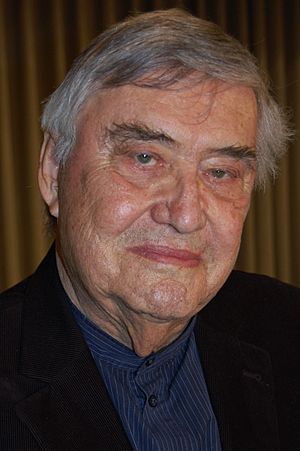Peter Härtling facts for kids
Quick facts for kids
Peter Härtling
|
|
|---|---|

Härtling in 2013
|
|
| Born | 13 November 1933 Chemnitz, Germany
|
| Died | 10 July 2017 (aged 83) Rüsselsheim am Main, Germany
|
| Occupation | Writer, poet |
| Signature | |
Peter Härtling (13 November 1933 – 10 July 2017) was a famous German writer, poet, publisher, and journalist. He was given the Order of Merit of the Federal Republic of Germany because of his big impact on German literature.
Contents
About Peter Härtling
Peter Härtling was born in Chemnitz, Germany. He spent his early childhood in Hartmannsdorf. His father had a law office there. When World War II started, his family moved to Olomouc, a town in Moravia that Germany had taken over.
As the war ended, Peter's family had to leave Olomouc quickly. They fled from the Red Army and settled for a short time in Zwettl, Austria. Sadly, Peter's father was captured by the Russians. He died in June 1945 in a prisoner-of-war camp in Dollersheim.
After World War II ended, Peter Härtling finally settled in Nürtingen, Baden-Württemberg. He studied art at the Bernsteinschule art school. After that, he started working as a journalist.
His Writing Career
Peter Härtling published his first collection of poems in 1953. From 1967 to 1973, he was the boss of a German publishing company called S. Fischer Verlag in Frankfurt.
After leaving the publishing house, Peter Härtling became a full-time writer. In 1983, he gave a series of lectures called the Frankfurter Poetik-Vorlesungen. In these lectures, he showed how a simple object could inspire a story. During this time, he wrote a short story called Der spanische Soldat. This story was based on a photograph by Robert Capa.
Härtling also worked as an editor for a magazine called Der Monat. He was also the president of the Hölderlin society. In 1973, he moved to Mörfelden-Walldorf. He lived there until he passed away on 10 July 2017.
What He Wrote About
A lot of Peter Härtling's writing, both poems and stories, was about history and his own past. His book Zwettl (1973) tells about the time his family lived in Austria after fleeing the war. His book Nachgetragene Liebe (1980) shares his earliest memories of his father, who had passed away.
Another big influence on his work was the literature and music from the Romanticism period. Härtling wrote stories that were like biographies about famous writers and composers. These included Friedrich Hölderlin, Wilhelm Waiblinger, E. T. A. Hoffmann, Franz Schubert, and Robert Schumann.
Books for Kids
In 1969, Peter Härtling started writing books for children. His first children's book, Und das ist die ganze Familie, came out the next year.
His children's books often talked about real-life problems that kids face. For example:
- Das war der Hirbel (1973) was about a child who had trouble fitting in at home.
- Oma (1975) talked about getting older and dealing with death.
- Theo haut ab (1977) was about leaving home and family.
Many of his children's books have been translated into English. Some of these are Granny (Oma), Crutches (Krücke), Ben Loves Anna (Ben liebt Anna), Old John (Alter John), and Herbie's World (Das war der Hirbel).
Radio Work
Peter Härtling also hosted a radio show called Literatur im Kreuzverhör. It was on the cultural radio station of Hessischer Rundfunk.
Awards He Won
Peter Härtling received many awards for his writing, including:
- 1964: Deutscher Kritikerpreis for Niembsch
- 1965: Lower Saxony Literature Prize for Niembsch
- 1966: Ehrengabe des Kulturkreises im Bundesverband der Deutschen Industrie for Niembsch. Prix du Meilleur Livre Étranger for the French edition of Niembsch
- 1971: Gerhart Hauptmann prize of the Freien Volksbühne Berlin for Gilles
- 1974: Schubart-Literaturpreis
- 1976: Deutscher Jugendliteraturpreis (Children's book) for Oma.
- 1977: Stadtschreiber von Bergen
- 1978: Wilhelmine-Lübke-Preis
- 1980: Zurich children's literature prize La vache qui lit for Ben liebt Anna and Sofie macht Geschichten.
- 1982: Naturschutzpreis der Kreisgruppe Groß-Gerau des Bundes für Umwelt und Naturschutz.
- 1987: Hermann Sinsheimer prize and Friedrich Hölderlin prize
- 1992: Lion Feuchtwanger prize.
- 1994: Awarded the title of Professor by the state of Baden-Württemberg
- 1995: Awarded the Großes Bundesverdienstkreuz
- 1995: Mainzer Stadtschreiber
- 1996: Awarded the Wilhelm Leuschner medal of Hessen
- 1996: Awarded the Karl Preusker Medal by the German Literature Conference
- 2000: Eichendorff Literature Prize
- 2001: Deutscher Jugendliteraturpreis (Special prize) for his major contribution to children's literature
- 2001: Dresdner Poetikdozentur zur Literatur Mitteleuropas (Publikation [1])
- 2003: Deutscher Bücherpreis for his contribution to literature
- 2004: Honorary citizen of Nürtingen
- 2006: Gerty Spies Literature Prize
- 2006: Finalist, Hans Christian Andersen Award
- 2007: Corine Literature Prize of the Bavarian Prime Minister for his contribution to literature
- 2010: Jacob Grimm Prize
- 2014: Hessischer Kulturpreis
Music Inspired by Härtling
In 1968, a composer named Wilhelm Killmayer used nine of Peter Härtling's poems. He set them to music in his song cycle called Nine Songs to Poems from Peter Härtling.
See also
 In Spanish: Peter Härtling para niños
In Spanish: Peter Härtling para niños

